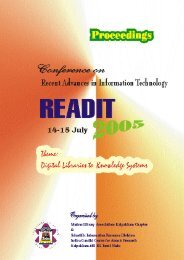READIT - 2009 - Indira Gandhi Centre for Atomic Research
READIT - 2009 - Indira Gandhi Centre for Atomic Research
READIT - 2009 - Indira Gandhi Centre for Atomic Research
Create successful ePaper yourself
Turn your PDF publications into a flip-book with our unique Google optimized e-Paper software.
Proceedings of <strong>READIT</strong>-<strong>2009</strong>, Kalpakkam - 603 102, 29-30 Dec <strong>2009</strong><br />
allow bloggers to share thoughts and feelings instantaneously with friends and family and is<br />
much faster than e-mailing or writing.<br />
2.2 Corporate and organizational blogs<br />
A blog can be private, as in most cases, or it can be <strong>for</strong> business purposes. Blogs,<br />
either used internally to enhance the communication and culture in a corporation or externally<br />
<strong>for</strong> marketing, branding or public relations purposes are called corporate blogs. Similar blogs<br />
<strong>for</strong> clubs and societies are called club blogs, group blogs, or by similar names; typical use is<br />
to in<strong>for</strong>m members and other interested parties of club and member activities.<br />
2.3 By genre<br />
Some blogs focus on a particular subject, such as political blogs, travel blogs (also<br />
known as travelogs), house blogs,[fashion blogs, project blogs, education blogs, niche blogs,<br />
classical music blogs, quizzing blogs and legal blogs (often referred to as a blawgs) or<br />
dreamlogs. Two common types of genre blogs are art blogs and music blogs. A blog<br />
featuring discussions especially about home and family is not uncommonly called a mom<br />
blog.<br />
2.4 By media type<br />
A blog comprising videos is called a vlog, one comprising links is called a linklog, a<br />
site containing a portfolio of sketches is called a sketchblog or one comprising photos is<br />
called a photoblog.[10] Blogs with shorter posts and mixed media types are called<br />
tumblelogs. Blogs that are written on typewriters and then scanned are called typecast or<br />
typecast blogs. A rare type of blog hosted on the Gopher Protocol is known as a Phlog.<br />
2.5 By device<br />
Blogs can also be defined by which type of device is used to compose it. A blog<br />
written by a mobile device like a mobile phone or PDA could be called a moblog. One early<br />
blog was Wearable Wireless Webcam, an online shared diary of a person's personal life<br />
combining text, video, and pictures transmitted live from a wearable computer and EyeTap<br />
device to a web site. This practice of semi-automated blogging with live video together with<br />
text was referred to as sousveillance. Such journals have been used as evidence in legal<br />
matters.<br />
3. LIBRARY BLOG OR LIBRARY 2.0<br />
This is the blog useful <strong>for</strong> libraries to expose4 their resources by announcement to<br />
their readers. And also Library 2.0 is helpful <strong>for</strong> the users to known the recent developments<br />
in the library. The library 2.0 is now is being trans<strong>for</strong>med into 3.0<br />
4. LIBRARY 3.0<br />
4.1 Virtual communities<br />
A virtual community, e-community or online community is a group of people that<br />
primarily interact via communication media such as newsletters, telephone, email, internet<br />
social network service or instant messages rather than face to face, <strong>for</strong> social, professional,<br />
educational or other purposes. If the mechanism is a computer network, it is called an online<br />
community. Virtual and online communities have also become a supplemental <strong>for</strong>m of<br />
communication between people who know each other primarily in real life. Many means are<br />
used in social software. Virtual communities or online communities are used <strong>for</strong> a variety of<br />
social and professional groups interacting via the Internet. It does not necessarily mean that<br />
there is a strong bond among the members, although Howard Rheingold, author of the book<br />
of the same name, mentions that virtual communities <strong>for</strong>m “when people carry on public<br />
35

















